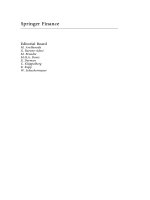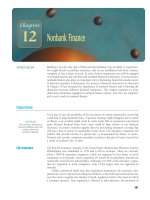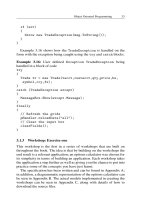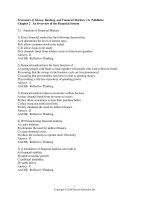Building strong and sustainable organizations, financial markets, and economies pot
Bạn đang xem bản rút gọn của tài liệu. Xem và tải ngay bản đầy đủ của tài liệu tại đây (243.85 KB, 6 trang )
THE INTERNATIONAL
FEDERATION OF
ACCOUNTANTS
Building strong and sustainable organizations,
nancial markets, and economies
International
Federation
of Accountants
The International Federation of Accountants (IFAC) is the global organization for the accountancy profession. It
is dedicated to serving the public interest by strengthening the profession and contributing to the development
of strong international economies. IFAC has 167 members and associates in 127 countries around the world,
representing approximately 2.5 million accountants in public practice, education, government service, industry,
and commerce.
WHAT IFAC DOES
IFAC provides the structures and processes that support the development, adoption, and implementation of high-
quality international standards. The standards IFAC supports—in the areas of auditing, assurance, and quality
control; public sector accounting; accounting education; and ethics—are an important part of the global nancial
infrastructure and contribute to economic stability around the world. In addition, working closely with its member
bodies, IFAC provides tools and guidance to support professional accountants in business and small and medium
practices. IFAC supports the development of the accountancy profession in emerging economies, and speaks
out on public interest issues where the profession’s voice is most relevant. Through all of these activities, IFAC
promotes its values of integrity, transparency, and expertise.
THE IMPORTANCE OF INTERNATIONAL STANDARDS
High-quality international standards enable investors and others to compare enterprises in a transparent way and,
therefore, make more informed investing decisions, while also increasing investor condence.
This in turn strengthens global markets and trade by:
Promoting more efcient markets
Reducing economic uncertainty
Enhancing international nancial stability
Strengthening economic growth and development in emerging economies
Increasing Foreign Direct Investment (FDI)
Promoting the growth and development of small- and medium-sized entities, key drivers of economic growth
In the public sector, international standards ensure that governments and other public entities are held to the
same level of accountability as the private sector. This is especially relevant as many governments, in addressing
the global nancial crisis, have assumed vastly expanded nancial responsibilities and are seeking ways to
prevent future sovereign debt crises. Both of these situations highlight the need for greater transparency and
accountability in the public sector.
WHAT IS IFAC?
STANDARDS
IFAC supports four independent standard-setting boards:
International Accounting Education Standards Board
International Auditing and Assurance Standards Board
International Ethics Standards Board for Accountants
International Public Sector Accounting Standards Board
Accounting standards for the private sector—International Financial Reporting Standards (IFRSs)—are produced
by the International Accounting Standards Board (IASB), which does not operate under the auspices of IFAC.
TOOLS, GUIDANCE, AND OTHER MATERIALS
In addition to standards, the IFAC committees and the independent standard-setting boards produce tools and
guidance to facilitate the adoption and implementation of standards. They also work closely with member bodies
to produce materials to respond to and support the needs of particular constituencies: small- and medium-sized
practices (SMPs), practitioners in emerging economies, and professional accountants in business, which represent
a large proportion of professional accountants worldwide. Examples of these tools include:
ISA Modules—a series of videos and PowerPoint presentations that support the Clarity ISAs
Practice Management, ISA Implementation, and Quality Control guides for SMPs
Sustainability Framework 2.0—a web-based tool that addresses the way organizations integrate sustainability
into strategy, planning, enterprise risk management, and operations
Competent and Versatile: How Professional Accountants in Business Drive Sustainable Success—a report that
promotes the value of professional accountants in business to their organizations
Establishing and Developing a Professional Accountancy Body—a good practice guide that covers the roles
and responsibilities of a professional accountancy organization, education and examinations, and capacity
development
REGULATION AND PUBLIC POLICY
IFAC is committed to researching and representing the views of the profession and its stakeholders to regulators
and other public policy makers. Through recommendation letters addressed to the G-20 leaders, policy position
papers on relevant topics, and other initiatives, IFAC aims to represent the voice of the global accountancy
profession.
IFAC’S KEY AREAS OF FOCUS
IFAC’s vision is for the global accountancy profession to be recognized as a valued leader in the development of
strong and sustainable organizations, nancial markets, and economies.
IFAC’s mission is to serve the public interest by:
Contributing to the development, adoption, and implementation of high-quality international standards and
guidance
Contributing to the development of strong professional accountancy organizations and accounting rms,
and to high-quality practices by professional accountants
Promoting the value of professional accountants worldwide
Speaking out on public interest issues where the accountancy profession’s expertise is most relevant
IFAC’s 2011-2014 Strategic Plan is focused on activities and services that will enhance the relevance of the
accountancy profession. The global nancial crisis, sovereign debt crisis, and economic downturn have all
magnied the importance of IFAC’s role in the world. The Strategic Plan calls for the accountancy profession to
take an active role in the development of strong and sustainable organizations, nancial markets, and economies.
SERVING THE PUBLIC INTEREST
The standard-setting boards supported by IFAC receive input from independent groups and individuals to ensure
that their work serves a balanced and diverse constituency. These independent groups and individuals also ensure
that the boards are not operating in silos—that their work benets all professional accountants, as well as all
levels of society that are impacted by the responsibilities of the accountancy profession.
In 2005, the Public Interest Oversight Board (PIOB) was established as the oversight body for the global
accountancy profession. The PIOB oversees IFAC’s public interest activities with the objective of increasing the
condence of investors and others that these activities are properly responsive to the public interest. The PIOB
also ensures that due process is followed, including international exposure and consultation, and that the views
of all those affected by new standards are thoroughly considered. The PIOB oversees the activities of the IAASB,
IAESB, and IESBA, as well as IFAC’s Compliance Advisory Panel. PIOB members are nominated by international
institutions and regulatory bodies, including the International Organization of Securities Commissions, the
Basel Committee on Banking Supervision, the International Associate of Insurance Supervisors, the European
Commission, and the World Bank.
HOW DOES IFAC SERVE ITS MEMBERS,
THE GLOBAL COMMUNITY, AND THE
PUBLIC INTEREST?
IFAC supports four independent standard-setting boards, and has three constituency-focused committees.
Each board and committee is comprised of volunteers from around the world, who represent a broad range of
experience and include both practitioners and non-practitioners. IFAC strives to maintain balance within each
group in terms of gender, geography, and sector of the accountancy profession.
INTERNATIONAL AUDIT AND ASSURANCE STANDARDS BOARD (IAASB)
The IAASB sets International Standards on Auditing (ISAs). As of November 2011, over 75 jurisdictions are
using or have signaled their intent to use the claried ISAs, which became effective for nancial statements for
periods ending after December 15, 2009. The IAASB also sets assurance standards, including those for review
engagements, as well as standards for related services.
INTERNATIONAL ACCOUNTING EDUCATION STANDARDS BOARD (IAESB)
The IAESB sets International Education Standards (IESs). It also develops and issues guidelines and information
papers on pre-qualication education, training of professional accountants, and continuing professional
education and development.
INTERNATIONAL ETHICS STANDARDS BOARD FOR ACCOUNTANTS (IESBA)
The IESBA develops the Code of Ethics for Professional Accountants (the IESBA Code). The IESBA Code applies to
all professional accountants, whether in public practice, business, education, or the public sector. IFAC member
bodies and rms issuing reports in accordance with ISAs must apply standards that are at least as stringent as
those stated in the IESBA Code.
INTERNATIONAL PUBLIC SECTOR ACCOUNTING STANDARDS BOARD (IPSASB)
The IPSASB sets International Public Sector Accounting Standards (IPSASs) for use by public sector entities,
including national, regional, and local governments, and related governmental agencies. A key part of the
IPSASB’s strategy is to converge the IPSASs, to the extent appropriate, with the IFRSs issued by the IASB.
PROFESSIONAL ACCOUNTANCY ORGANIZATION (PAO) DEVELOPMENT COMMITTEE
Approximately 60 percent of IFAC member bodies operate in developing nations, which face capacity and
resource constraints. The PAO Development Committee represents and addresses the interests of these emerging
economies by providing tools and guidance, conducting outreach, and seeking resources and development
assistance from member bodies, the donor community, and other organizations.
PROFESSIONAL ACCOUNTANTS IN BUSINESS (PAIB) COMMITTEE
The PAIB Committee serves, via the IFAC network of member bodies, more than one million professional
accountants worldwide who work in commerce, industry, nancial services, education, and the public and
not-for-prot sectors. The vision of the committee is to enhance global recognition of professional accountants
as business leaders and strategic partners in building long-term sustainable success. Key areas of focus include
sustainability, business reporting, corporate governance, and nancial management.
SMALL AND MEDIUM PRACTICES (SMP) COMMITTEE
The SMP Committee represents the interests of professional accountants operating in SMPs and other
professional accountants who provide services to small- and medium-sized enterprises (SMEs). Working closely
with IFAC member bodies, the committee issues tools and guidance specic to this sector and ensures that the
needs of SMPs and SMEs are considered by standard setters.
BOARDS AND COMMITTEES
For more information please contact:
IFAC
545 Fifth Avenue, FL 14
New York, NY 10017
USA
T +1 212 471 8707
www.ifac.org
IFAC’s members are professional accountancy organizations, spanning 127 countries and including developing,
emerging, and developed countries, as well as regional organizations and acknowledged accountancy groupings.
Through its member organizations, IFAC represents approximately 2.5 million accountants in public practice,
education, government services, industry, and commerce. IFAC has three levels of membership: member,
associate, and afliate.
MEMBERSHIP COMMITMENTS
IFAC members are required to commit to a series of obligations called the Statements of Membership Obligations
(SMOs), which establish IFAC’s membership requirements and serve as the foundation of the Member Body
Compliance Program. The SMOs require members and associates to use their best endeavors to promote,
incorporate, and implement the standards of the IAASB, IAESB, IESBA, IPSASB, and the International Accounting
Standards Board (IASB), including monitoring of their members through quality assurance and investigation and
discipline programs.
The IFAC Member Body Compliance Program supports members in developing and incorporating these
international standards into national standards. As a result, the program furthers convergence to international
standards, encourages professional accountants’ compliance with these standards, and provides a fundamental
means for supporting members in enhancing the quality of practice by accountants worldwide.
IFAC’s Compliance Advisory Panel (CAP) oversees the IFAC Member Body Compliance Program. The CAP also
makes recommendations to the IFAC Board regarding new member applicants and the membership application
process.
WHO ARE IFAC’S MEMBERS?









